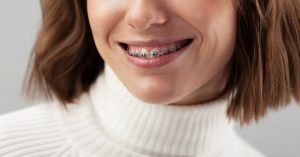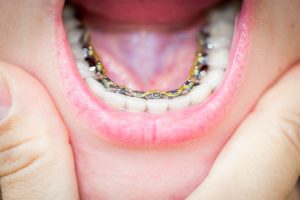Can Braces Fix TMJ?
The Link Between Braces and TMJ

How Do Braces Work?
Metal Braces
Metal braces consist of brackets, archwires, and ligatures. Archwires are inserted into the brackets and secured with ligatures, which are small elastic or metal ties. The archwires exert continuous gentle pressure, guiding the teeth into proper alignment over time.
Self-Ligating Braces
Self-ligating braces are similar to metal braces but don’t need ligatures. These braces utilize special brackets that have built-in clips or doors to hold the archwire in place. The absence of ligatures reduces friction, allowing for smoother and more efficient tooth movement.
Ceramic Braces
Ceramic braces operate feature brackets made of tooth-colored or clear ceramic material. This aesthetic advantage makes them a popular choice among individuals seeking a less noticeable orthodontic treatment option. Ceramic braces use archwires and ligatures like traditional braces to exert pressure and gradually shift the teeth into alignment.
Lingual Braces
Lingual braces are a discreet alternative to traditional braces as they are placed on the back surfaces of the teeth facing the tongue. This positioning makes them virtually invisible from the front. Lingual braces employ brackets and archwires, similar to metal braces, but are customized to fit the individual’s teeth and bite.
Understanding TMJ Disorders
The temporomandibular joint (TMJ) is a complex hinge joint that connects your jawbone to your skull. It plays a crucial role in allowing you to open and close your mouth, chew, and speak. However, when problems arise with this joint, it can lead to a condition known as TMJ disorder, or TMD.
Symptoms of this disorder can include:
- Jaw Pain: Persistent pain or tenderness in the jaw joint, which may radiate to the face, neck, or shoulders.
- Clicking or Popping Sounds: A clicking, popping, or grating sound when opening or closing the mouth, often accompanied by limited jaw movement.
- Difficulty Chewing: Problems or discomfort while chewing or biting, possibly leading to avoidance of certain foods.
- Locking of the Jaw: The jaw may temporarily get stuck or locked in an open or closed position.
- Headaches: Chronic headaches, including tension headaches or migraines, may be associated with TMJ disorders.
- Ear Pain: Unexplained earaches or a feeling of fullness in the ears, even without signs of infection.
- Facial Discomfort: Facial pain, particularly around the cheeks, temples, or jawline.
The Role of Braces in TMJ Treatment

- Correcting Misalignment: Braces can address dental misalignments, such as malocclusion or a bad bite, which can contribute to TMJ symptoms.
- Improving Jaw Position: By properly aligning the jaws, braces help relieve strain on the temporomandibular joint, potentially reducing TMJ-related discomfort.
- Balancing the Bite: Braces can optimize the bite, ensuring that the upper and lower teeth meet correctly. This balance can alleviate stress on the jaw joint, thereby reducing TMJ symptoms.
- Supporting Orthodontic Treatment: In some cases, TMJ may coexist with other orthodontic issues. Braces can help address these concerns alongside TMJ treatment, providing a comprehensive approach.
While braces offer potential benefits, it’s best to consult with Dr. Grussmark to determine the most appropriate treatment plan for individual cases.
Learn More with Our Experienced Orthodontist Specialist
Braces can play a significant role in addressing TMJ symptoms and improving overall jaw function. However, braces may not be a standalone solution for all cases of TMJ. Call our Miami, FL, office today at (305) 441-1200 to schedule a consultation and learn more. We welcome patients from Brickell, Miami Beach, and Coral Gables.

